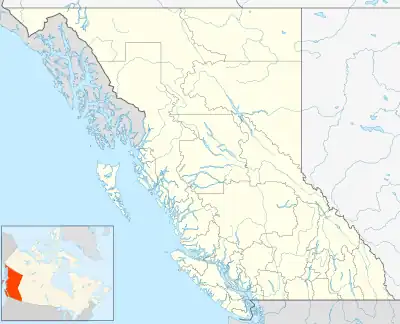Niagara | |
|---|---|
 Niagara Location of Niagara in British Columbia | |
| Coordinates: 49°06′00″N 118°28′00″W / 49.10000°N 118.46667°W | |
| Country | |
| Province | |
| Region | Boundary Country |
| Regional district | Kootenay Boundary |
| Area codes | 250, 778, 236, & 672 |
Niagara is on the west side of the Granby River, near the junction with Fisherman Creek, in the Boundary Country region of south central British Columbia.[1] The small community is about 12 kilometres (7 mi) north of Grand Forks on North Fork Rd.
Prosperity
In 1898, a Spokane syndicate bought part of the "Gunnysack Jones" ranch, and laid out a townsite, in anticipation of the coming Columbia and Western Railway (C&W), which was acquired by the Canadian Pacific Railway. The source of the name is unclear, but could either be the Niagara Falls, or the USS Niagara, which served in the Spanish–American War that year.[2][3] During the railway construction, a work camp was cut out of the mountainside for the nearby 210-metre (700 ft) tunnel.[4] The town experienced rapid growth and brief prosperity. Having 12 hotels at its peak,[5] a stage coach ran daily to Grand Forks.[2]
Fading
In 1900, the train station name changed to Fisherman, but the locality faded away after the railway construction workers moved on.[2] The C&W siding was named for the creek, first mentioned in 1894, but not officially adopted until 1956.[6] By 1918, all permanent residents had left.[7] Niagara was by rail 8 kilometres (5 mi) north of Grand Forks, and 13.5 kilometres (8.4 mi) southeast of Eholt.[8] The stop closed in 1955.
The former residential and commercial properties are a ghost town. Several much later residences are concentrated near the river.
| Train Timetables (Regular stop or Flag stop) | ||||||||||||||||
|---|---|---|---|---|---|---|---|---|---|---|---|---|---|---|---|---|
| Year | 1901 | 1903 | 1905 | 1909 | 1912 | 1916 | 1919 | 1929 | 1932 | 1935 | 1939 | 1943 | 1948 | 1953 | 1954 | 1955 |
| Ref. | [9] | [10] | [11] | [12] | [13] | [14] | [15] | [16] | [17] | [8] | [18] | [19] | [20] | [21] | [22] | [23] |
| Type | Reg | Flag | Flag | nil | Flag | Flag | Reg/Flag | Flag | Flag | Flag | Flag | Flag | Flag | Flag | Flag | nil |
Virginia City
In 1898, 2.4 kilometres (1.5 mi) upstream on the Granby, another town seeking to cash in on railway construction and mining prospects was surveyed. Although a hotel was allegedly under construction, the place faded into obscurity.[24]
References
- ↑ "Niagara (locality)". BC Geographical Names.
- 1 2 3 "Nelson Star, 9 Apr 2016". www.nelsonstar.com. 9 April 2016.
- ↑ Basque Garnet (1982). British Columbia Ghost Town Atlas. Sunfire Publications.
- ↑ Turner, Robert D.; Wilkie, J.S. David (2007). Steam Along the Boundary. Sono Nis Press. p. 39. ISBN 978 1-55039-158-9.
- ↑ Ghost Towns and Mining Camps of the Boundary Country, p. 147, at Google Books
- ↑ "Castlegar News, 5 Apr 2018". www.castlegarnews.com. 5 April 2018.
- ↑ "1918 BC Directory". www.bccd.vpl.ca.
- 1 2 "1935 timetable". www.library.ubc.ca. p. 10 (TT 70).
- ↑ "1900–01 BC Directory". www.bccd.vpl.ca.
- ↑ "1903 timetable". www.library.ubc.ca. p. 25 (40).
- ↑ "1905 timetable". www.library.ubc.ca. p. 62 (43).
- ↑ "1909 timetable". www.library.ubc.ca. p. 78 (45).
- ↑ "1912 timetable". www.library.ubc.ca. p. 92 (TT114).
- ↑ "1916 timetable". www.library.ubc.ca. p. 159 (TT129).
- ↑ "1919 timetable". www.library.ubc.ca. p. 183 (TT119).
- ↑ "1929 timetable". www.library.ubc.ca. p. 30 (TT114).
- ↑ "1932 timetable". www.library.ubc.ca. p. 469 (TT151).
- ↑ "1939 timetable". www.library.ubc.ca. p. 126 (TT151).
- ↑ "1943 timetable" (PDF). www.streamlinermemories.info. p. 44 (TT151).
- ↑ "1948 timetable". www.library.ubc.ca. p. 45 (TT151).
- ↑ "1953 timetable". www.library.ubc.ca. p. 44 (TT121).
- ↑ "1954 timetable". www.library.ubc.ca. p. 44 (TT121).
- ↑ "1955 timetable". www.library.ubc.ca. p. 44 (TT121).
- ↑ "Trail Times, 27 Oct 2017". www.trailtimes.ca. 27 October 2017.